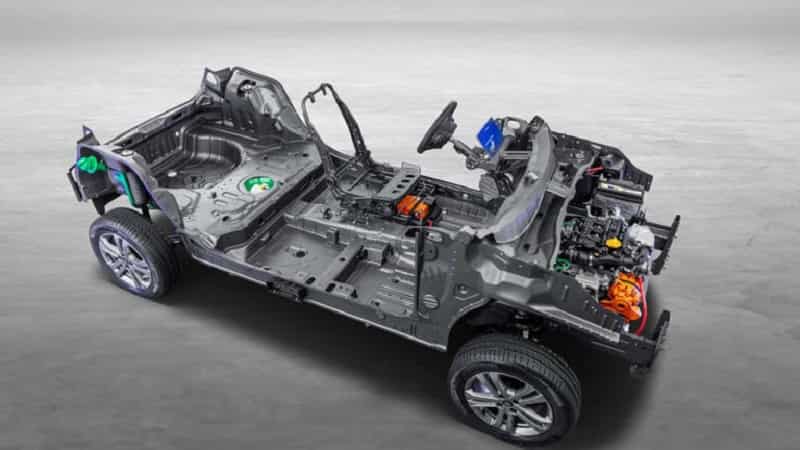Biochemicals Bio-Hybrid Engines – Starlinger to provide PET recycling lines to Srichakra Polyplast 03-08-2023 - Arhive
Biochemicals Bio-Hybrid Engines
Crude Oil Prices Trend
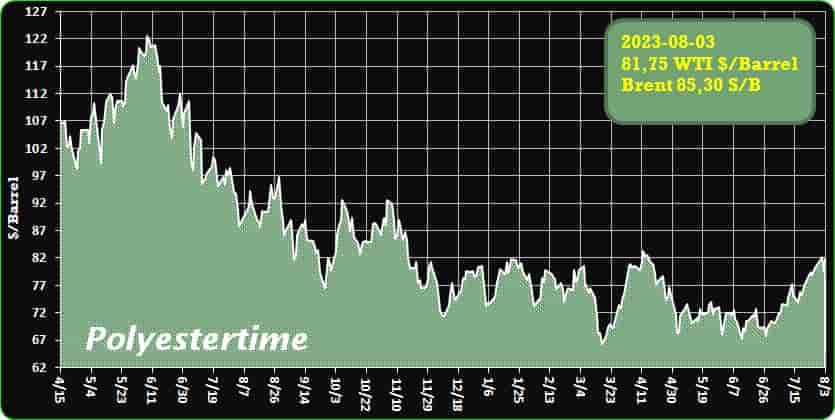
Crude Oil Prices Trend by Polyestertime
Technip Energies and Enerkem Inc. have recently forged a memorandum of understanding, heralding a promising Collaboration Agreement
This partnership aims to expedite the deployment of Enerkem’s revolutionary technology platform, designed to convert non-recyclable waste materials into biofuels and circular chemical products. The joint effort signifies a significant step forward in addressing the challenges of hard-to-abate sectors such as sustainable aviation and marine fuels.
Enerkem has gained prominence for its pioneering gasification technology, which transforms non-recyclable waste into eco-friendly biofuels, low-carbon fuels, and circular chemicals. The company has been operating a successful commercial demonstration facility in Alberta, Canada, since 2016. Furthermore, Enerkem is actively involved in developing and constructing new commercial-scale waste-to-methanol facilities in Canada and Europe. Biochemicals Bio-Hybrid Engines
Technip Energies, renowned for its accomplishments in bio and low-carbon fuels projects worldwide, will bring its expertise in engineering, technology integration, and project delivery to support Enerkem’s ventures. The collaboration is set to bolster Enerkem’s project delivery capacity and speed. Moreover, the partnership will prioritize strategic efforts to optimize design elements and streamline the industrialization of Enerkem’s groundbreaking designs for future projects.
To expedite the deployment of its technology, Enerkem is planning to establish a Development Company (DevCo). The primary focus of DevCo is to acquire suitable sites and secure the necessary permits for replicable methanol biorefinery designs, which will facilitate the production of bio and low-carbon fuels, along with circular chemicals.
Dominique Boies, CEO of Enerkem, expressed enthusiasm about the collaboration with Technip Energies, highlighting their joint efforts to accelerate the deployment of Enerkem’s technology in Europe, North America, and the Middle East. Boies emphasized that Technip Energies’ extensive expertise will enable Enerkem’s clients to benefit from quicker project delivery and cost efficiencies, thereby supporting their decarbonization endeavors and sustainability objectives. Biochemicals Bio-Hybrid Engines
Bhaskar Patel, Senior Vice President of Sustainable Fuels, Chemicals, and Circularity at Technip Energies, also conveyed his delight in partnering with Enerkem. He emphasized their shared commitment to deploying Enerkem’s technology platform for converting waste into valuable and sustainable end products like biofuels. Patel further emphasized that by leveraging Technip Energies’ proficiency in engineering, sustainable chemistry, and biofuels projects, they will be able to support project execution and expedite Enerkem’s technology deployment.
In a noteworthy development, Technip Energies has recently made a significant investment in Evok Innovation’s Fund II. This cleantech fund is dedicated to promoting the development of hard-tech solutions that contribute to achieving a net-zero future. Focused on cutting-edge sectors such as low-carbon hydrogen, carbon capture and removal, electrification, and critical minerals, this investment reflects Technip Energies’ commitment to supporting innovative and sustainable solutions for a greener tomorrow.
In conclusion, the collaboration between Technip Energies and Enerkem signifies a major milestone in advancing waste-to-biofuels and circular chemicals technology. Through this partnership, Enerkem’s innovative gasification technology will gain wider deployment across various regions, enabling the production of sustainable and valuable end products. With Technip Energies’ extensive experience and commitment to supporting clean technology, the joint effort promises to accelerate the transition towards a more sustainable and decarbonized future. Biochemicals Bio-Hybrid Engines
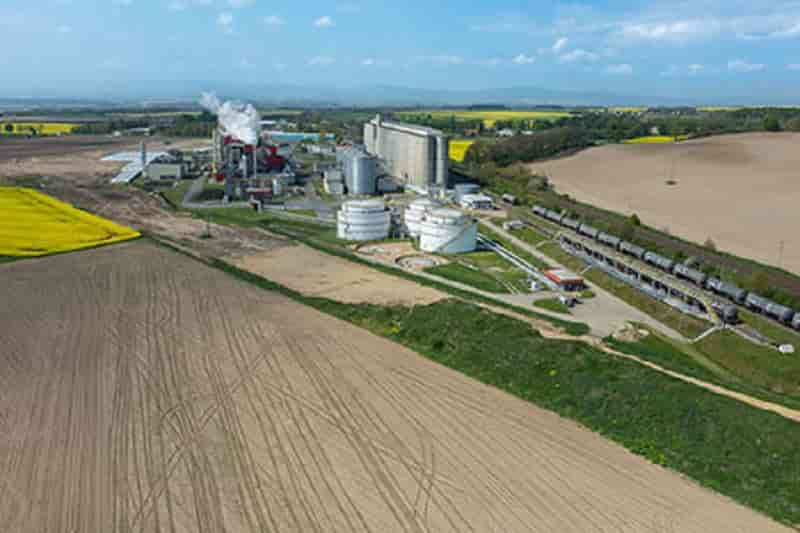
Fitch’s Historic Downgrade on US Rating Sends Shockwaves through Asian Markets
In the wake of ongoing global economic challenges and contracting PMI indices, Asian markets experienced a sharp decline after Fitch Ratings made a historic decision to downgrade the United States’ credit rating from AAA to AA+. The repercussions of this downgrade were felt across major Asian stock exchanges, triggering a sell-off and further exacerbating concerns about the state of the global economy.
As the clock struck 7:30 Italian time on August 2, the Nikkei in Japan witnessed a significant drop of 2.5%, while the Hang Seng in Hong Kong fell by 2.10%. China’s Shanghai Composite also recorded a decline of 0.95%. Amid the market turbulence, gold prices surged by 0.33%, reaching $1,985 an ounce, while American WTI oil continued its upward trend, rising by 0.85% to $82 per barrel. Biochemicals Bio-Hybrid Engines
The euro maintained its stability against the US dollar at 1.0999, and the yen made a modest recovery of 0.35% to 142.83. Simultaneously, the 10-year US Treasury bond saw a slight increase in yield, rising to 4.026%. Nasdaq futures and S&P futures also faced negative territory, with losses of 0.7% and 0.5% respectively.
The downgrade by Fitch was not an isolated event; rather, it reflects the prevailing concerns over the global economic landscape. On the previous day, a private survey conducted by Caixin revealed that China’s industrial activity had contracted in July. The survey attributed this decline to high youth unemployment, mounting local debt pressure, and weak demand. This data was in line with the official PMI published by the Beijing government.
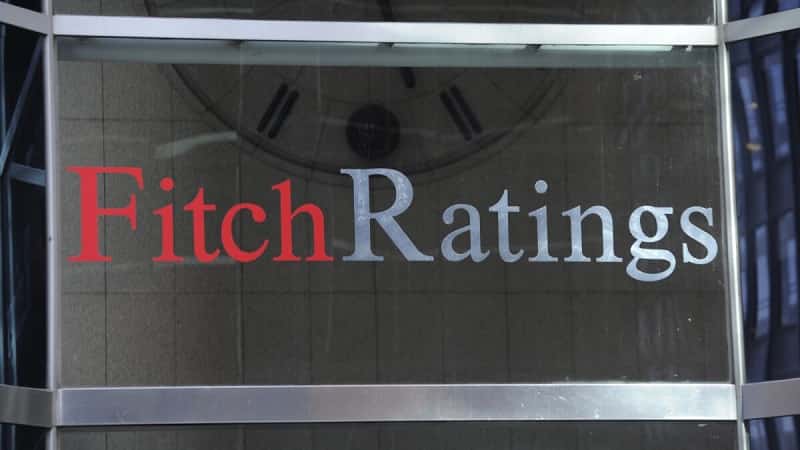
The impact of the US rating downgrade was particularly severe on Chinese stocks, with sectors like healthcare, utilities, technology, and financials experiencing significant sell-offs. Banks and financial institutions, in particular, faced considerable pressure as investors responded to the Fitch decision.
Fitch justified its downgrade by pointing to the “fiscal deterioration expected over the next three years, a high and growing public debt burden, and governance erosion” in the US. The agency also expressed concerns over the repeated political deadlocks related to the debt ceiling and the last-minute resolutions that have eroded confidence in fiscal management. While the White House disagreed with the decision, Treasury Secretary Janet Yellen criticized the downgrade as arbitrary.
Fitch’s move echoes a similar action taken by Standard & Poor’s (S&P) over a decade ago. The agency’s decision to remove the long-standing AAA rating, which had been in place since at least 1994, has raised questions about the country’s future economic prospects. Despite the downgrade, Fitch maintains a stable outlook on the United States.
The repercussions of the US rating downgrade are likely to reverberate through global financial markets in the coming days and weeks. As economic uncertainty continues to prevail, investors and governments will closely monitor developments and take measures to mitigate risks and ensure stability. Biochemicals Bio-Hybrid Engines
The interconnectedness of the global economy underscores the need for coordinated efforts among nations to address economic challenges effectively. In such a volatile environment, a cautious approach to fiscal management and a commitment to resolving political deadlocks are essential to restore confidence and sustain economic growth.

Mr. Xi Jinping President of China
UPM Biochemicals’ Acquisition of SunCoal Industries: Advancing Sustainable Biofunctional Fillers
UPM, a leading bio-based company, recently announced its acquisition of SunCoal Industries GmbH, a pioneering Germany-based firm renowned for its lignin valorisation technology. This technology empowers the production of high-performance products from renewable raw materials. The strategic acquisition positions UPM to strengthen its biorefining business and solidify its position as a prominent supplier of sustainable, renewable functional fillers (RFF).
One of the key focal points of this acquisition is the integration of SunCoal Industries’ lignin valorisation technology into the production of UPM’s BioMotion renewable functional fillers at the biorefinery currently under construction in Leuna. This move is expected to enhance UPM’s technology portfolio, amplifying its capacity to offer sustainable alternatives to traditional, oil-based carbon black, precipitated silica, and other filler materials used in various industries. Biochemicals Bio-Hybrid Engines
UPM’s BioMotion renewable functional fillers are produced from certified forest operations, ensuring a sustainable and eco-friendly source. These fillers have a significantly lower carbon dioxide footprint compared to their fossil-based counterparts, making them a vital component in driving the transition towards a greener and more sustainable future.
The acquisition of SunCoal Industries comes with the added benefit of the company’s team of experts in lignin valorisation. UPM plans to capitalize on this expertise to further develop and optimize the technology in-house. As a result, UPM will be at the forefront of innovative solutions, providing the market with advanced, sustainable functional fillers.
SunCoal Industries, established in 2007 and headquartered in Ludwigsfelde, Brandenburg, boasts pilot and lab facilities and a dedicated team of 30 professionals.
The company holds a global patent for its hydrothermal treatment technology, which has now been licensed to UPM and successfully implemented at an industrial scale at the Leuna biorefinery. Biochemicals Bio-Hybrid Engines
The Leuna biorefinery in Germany, representing an investment of around €1,180 million, is set to become the world’s first industrial-scale biorefinery. Scheduled for completion by the end of 2023, the facility will be a game-changer in the sustainable production of various products, including sugars, lignin, and residue streams for bioenergy and biofuels.
The sugars extracted from the biorefinery will undergo a streamlined one-step conversion process, resulting in renewable monoethylene glycol (BioMEG) and monopropylene glycol (BioMPG). Additionally, the lignin valorisation technology from SunCoal Industries will transform lignin into renewable functional fillers, offering a diversified range of sustainable alternatives for the rubber and plastic industries.
Winfried Schaur, UPM’s executive vice president of Technology & Biorefining, expressed excitement about the acquisition’s potential impact on renewable chemicals markets and the growth of UPM’s biorefining businesses. The acquisition marks a significant step in scaling UPM’s biorefinery ventures, complementing its existing advanced biofuels refinery in Lappeenranta and the forthcoming fuels and chemicals refinery in Rotterdam.
Tobias Wittmann and Friedrich von Ploetz, founding partners of SunCoal Industries, welcomed the acquisition and praised UPM’s commitment to building the biorefinery in Saxony-Anhalt as a successful example of German-Finnish cooperation in an emerging, technology-driven market. Biochemicals Bio-Hybrid Engines
In conclusion, UPM Biochemicals’ acquisition of SunCoal Industries is a transformative move that consolidates UPM’s position as a leader in the sustainable and renewable functional fillers market. By harnessing SunCoal Industries’ lignin valorisation technology, UPM is advancing its commitment to greener alternatives and driving the shift towards a more sustainable future. The Leuna biorefinery and its innovative processes will undoubtedly play a vital role in UPM’s ongoing efforts to provide eco-friendly solutions that reduce our dependence on traditional, fossil-based resources.
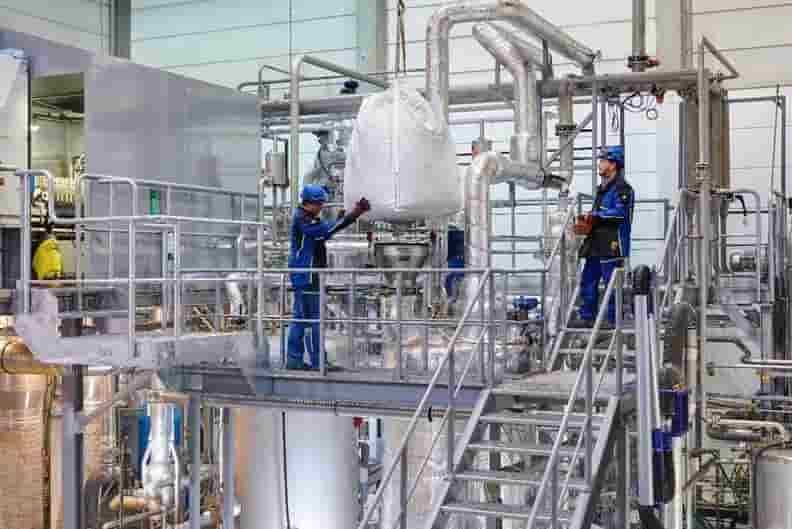
Plastics Industry Association Expresses Concerns Over EPA’s Draft Strategy on Plastic Pollution
The Plastics Industry Association (PLASTICS) recently submitted comments in response to the Environmental Protection Agency’s (EPA) request for public input on its Draft National Strategy to Prevent Plastic Pollution. However, the association expressed disappointment with the agency’s approach, highlighting their belief that the focus should be on post-consumer materials management and infrastructure instead of targeting essential materials’ production. Biochemicals Bio-Hybrid Engines
Matt Seaholm, President and CEO of PLASTICS, acknowledged the opportunity to provide feedback to the EPA but expressed concern over the draft strategy’s priorities. According to Seaholm, the EPA was directed by Congress, in a bipartisan manner, to prioritize post-consumer materials management and infrastructure. Unfortunately, the first stated objective in the current strategy is to reduce the production of essential materials, which the plastics industry believes neglects the pressing issue of plastic waste.
Seaholm emphasized that the plastics industry is committed to investing billions of dollars in innovative recycling technologies to expand recycling capacity. Instead of restricting essential materials, the focus should be on improving recycling infrastructure to increase recycling rates in the United States. The plastics industry recognizes the need to address environmental challenges while appreciating the indispensable role plastics play in modern society. Biochemicals Bio-Hybrid Engines
PLASTICS firmly believes that understanding the essential nature of plastics and tackling environmental concerns are not mutually exclusive goals. By working collaboratively with the EPA and other stakeholders, they aspire to develop effective solutions that keep plastic waste out of the environment while maintaining the benefits of plastic materials.
Seaholm’s statement highlights the urgency to improve recycling rates in the U.S., acknowledging that the current recycling efforts are insufficient. As the industry strives to find viable solutions, PLASTICS is eager to cooperate with the EPA and any other willing parties who share the common goal of combating plastic waste effectively.
In related news, European Union lawmakers are moving towards accepting recent changes made by member countries to the bloc’s renewable energy law. The changes are aimed at providing assurances to countries such as France regarding potential exemptions for ammonia plants. The EU countries recently introduced late amendments to the law, addressing the challenges some ammonia plants face in transitioning to renewable fuels. Furthermore, the European Commission pledged to consider exempting such plants from renewable energy targets. Biochemicals Bio-Hybrid Engines
The developments in the EU highlight the ongoing efforts to strike a balance between environmental goals and industrial realities. While the renewable energy law aims to foster sustainability, it also recognizes that certain sectors might face difficulties in the transition. Flexibility and consideration of individual circumstances appear to be vital aspects of the EU’s approach.
In conclusion, the Plastics Industry Association’s response to the EPA’s Draft National Strategy to Prevent Plastic Pollution reflects their concern about the strategy’s focus on reducing essential materials’ production. Instead, the association emphasizes the importance of improving recycling infrastructure to combat plastic waste effectively. Cooperation between stakeholders, including the plastics industry and regulatory agencies, is essential in finding sustainable solutions. Similarly, the recent developments in the EU’s renewable energy law highlight the significance of balancing environmental targets with practical considerations for various industries. As the world continues to grapple with environmental challenges, collaboration and adaptability will be critical in achieving long-term sustainability goals. Biochemicals Bio-Hybrid Engines
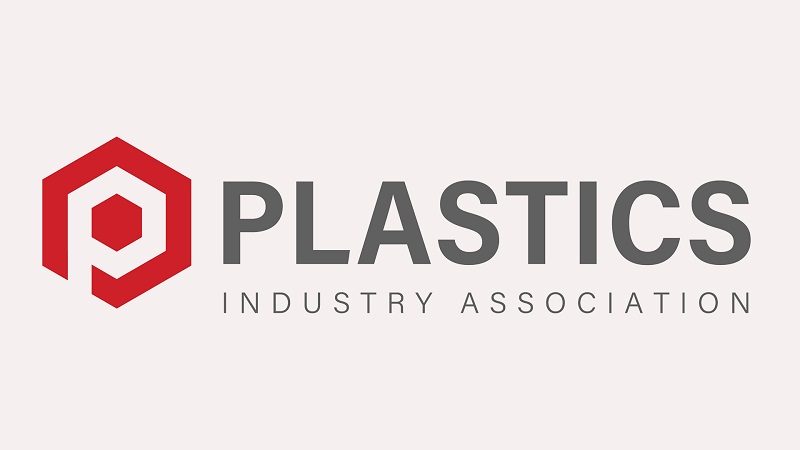
Stellantis Unveils Bio-Hybrid Engines: Pioneering Sustainable Mobility in Brazil
Introduction
In the pursuit of reducing emissions and promoting sustainable mobility, Stellantis, the leading automotive manufacturer in the South American market, has unveiled its revolutionary Bio-Hybrid engines. These engines combine biofuels with electric motors, presenting a compelling lineup of mild hybrid, full hybrid, and plug-in powertrains. With Brazil’s Rota 2030 plan encouraging investments in sustainable mobility, Stellantis aims to play a significant role in shaping the future of transportation. In this article, we will explore the workings of Stellantis’ Bio-Hybrid engines and their potential impact on Brazil’s automotive industry. Biochemicals Bio-Hybrid Engines
A Diverse Range of Choices
At the core of Stellantis’ Bio-Hybrid engines lies the Flex technology, enabling traditional internal combustion engines to utilize biofuels. Building upon this foundation, Stellantis integrates electric motors and batteries of varying capacities to create a range of electrified powertrains to suit diverse needs.
- Bio-Hybrid – The Mild Hybrid Solution
Starting the lineup is the basic Bio-Hybrid, which acts as a mild hybrid. It features a small 4 HP generator, doubling as an alternator and powering a sub-1 kWh battery. The Belt-Integrated Starter Generator (BSG) provides additional torque at low revs and facilitates coasting to minimize fuel consumption and emissions. This configuration is expected to find its place in entry-level models like the Fiat Argo, enhancing their efficiency and sustainability.
- Bio-Hybrid e-DCT – The Full Hybrid System
The Bio-Hybrid e-DCT is a full hybrid powertrain comprising a 22 HP (16 kW) electric motor capable of propelling the vehicle independently, supported by a 1 kWh battery. Prominent models such as the Fiat Pulse and Peugeot 2008 are projected to adopt this system, offering consumers a greener and more fuel-efficient driving experience.
- Bio-Hybrid Plug-in – The Future of Sustainable Mobility
The epitome of Stellantis’ innovative technology is the Bio-Hybrid Plug-in powertrain. As the name suggests, it incorporates on-demand hybrid systems with a powerful 60 HP (44 kW) electric motor and a 12 kWh battery, which can be recharged using columns or wallboxes. Already utilized in models like the Jeep Compass 4xe, this technology is adapted to internal combustion engines fueled by ethanol. With this setup, Stellantis aims to provide environmentally conscious consumers with an option for sustainable driving, reducing their carbon footprint while maintaining versatility. Biochemicals Bio-Hybrid Engines
Future Prospects and Challenges
Márcio Tonani, senior vice president of product development at Stellantis, has revealed that the Bio-Hybrid engines will work harmoniously with both the Firefly 1.0 and 1.3 engines, including turbo and naturally aspirated variants. The first models powered by Bio-Hybrid engines are slated to hit the Brazilian market in 2024, representing a crucial milestone in the country’s automotive landscape.
Despite the advancement of electrification, Brazil’s automotive industry continues to heavily rely on biofuels. While electric mobility gains momentum, challenges remain, such as the lack of widespread charging infrastructure. Stellantis’ innovative approach with Bio-Hybrid engines acts as a bridge, providing a viable solution until the necessary state investments bolster electric mobility infrastructure. Biochemicals Bio-Hybrid Engines
Looking Beyond: Exploring Fuel Cell Technology
Stellantis is not limiting itself to just hybrid solutions. As the automotive industry evolves, the company is exploring alternative technologies, such as fuel cells powered by bioethanol. This technology, similar to that used by Nissan in the NV200 SOFC van, harnesses biofuel to generate hydrogen through a chemical reaction, which is then used to produce energy in fuel cells. By diversifying their sustainable technology portfolio, Stellantis aims to continue driving advancements in eco-friendly transportation.
Conclusion
Stellantis’ Bio-Hybrid engines mark a significant step forward in the pursuit of sustainable mobility in Brazil. As the country aligns with global emissions reduction goals, Stellantis’ innovative powertrain solutions offer a range of options for consumers seeking eco-friendly and efficient transportation.
With the first models set to launch in 2024, Stellantis is poised to contribute substantially to Brazil’s automotive future, supporting the nation’s ambitious Rota 2030 plan while advocating for a greener and cleaner tomorrow. Biochemicals Bio-Hybrid Engines
The niche called bioplastics is growing
Plastic contributes considerably to global greenhouse gas emissions. In 2022, plastics produced 1.9 billion tons of greenhouse gas (GHG) emissions (3.5% of total global emissions), with 90% of this emission coming from plastic production, conversion from fossil fuels, and natural resource exploitation.
Carbon emissions have caused havoc in recent years. However, there is potential to conserve the ecosystem by using sustainable materials without sacrificing product quality. Because packaging accounts for ~35% of total plastic consumption, it is critical to developing a fully sustainable product. This percentage is primarily made up of single-use plastics. The main issue here is disposal, so reducing waste generation is the best solution. This is precisely where the concept of reusable and refillable packaging emerges. Metal and glass packaging solutions are becoming more popular, but they come with their own set of challenges (cost and logistics).
Bioplastics offer an alternative. Still a niche area, there are nevertheless numerous bio-based plastic materials that have been in the development or pilot phase for the past ten years that are expected to enter mass production in a few years. Major bio-based plastics suppliers and cosmetics companies have begun to sign contracts and material off-take agreements. Because of the risks associated with the potential price volatility of fossil fuels, the contract is an extremely important component for the ease of the transition from fossil to bio.
Successful single-use plastic alternatives include:
PEF is a 100% bio-based drop-in replacement for petrochemical PET (Polyethylene Terephthalate) packaging materials. PEF, like PET, can be used to make plastic bottles, films, and other packaging materials that are widely used in the personal care industry. In the industry, PEF is referred to as the next-generation polyester because it has better mechanical and barrier properties than polyester (PET) and is 100% bio-based.
Avantium (Netherlands), which plans to commercialize PEF on a large scale by the end of 2023, has already signed off-take agreements with major brand owners such as the LVMH group, which plans to use PEF-based packaging materials in their luxury cosmetic products. For example, Avantium’s PEF LCA analysis claims that the use of PEF in a bottle is expected to reduce GHG emissions by 33% over the lifecycle of the bottle. However, PEF’s mass acceptance in the market is yet to be proven.
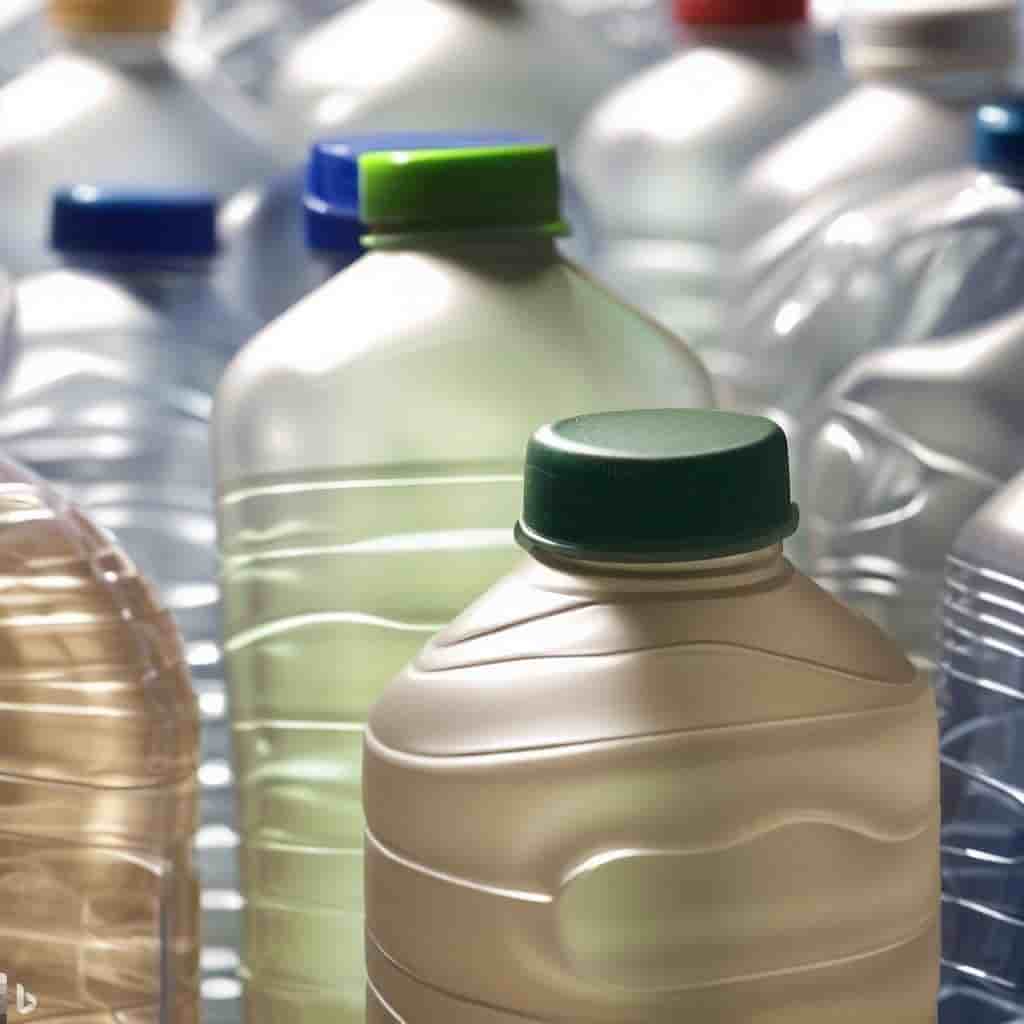
Starlinger to provide PET recycling lines to Srichakra Polyplast
Austrian machinery supplier Starlinger has taken a significant step towards enhancing plastic recycling in India by providing two state-of-the-art polyethylene terephthalate (PET) bottle-to-bottle recycling lines to Srichakra Polyplast, an Indian plastic recycling company. This collaboration is aimed at supporting Srichakra Polyplast’s efforts in manufacturing food-grade recycled PET (rPET) for the production of Coca-Cola India’s new water bottles made from 100% rPET.
The two recoSTAR PET 165 iV+PET bottle-to-bottle recycling lines ordered by Srichakra Polyplast are expected to be delivered and operational by the beginning of the next year. This development marks a significant milestone for both companies as they join forces to contribute to the sustainable packaging initiatives in India. Biochemicals Bio-Hybrid Engines
Srichakra Polyplast already has one Starlinger recoSTAR recycling line installed and functioning at its production facility in Hyderabad, Telangana, India, since 2021. This was the first bottle-to-bottle recycling line provided and installed by Starlinger in India, making it a pioneering initiative in the region’s recycling landscape.
The primary objective of deploying these recycling lines is to manufacture food-grade rPET that adheres to stringent quality and safety standards. Coca-Cola India’s recent decision to use 100% rPET packaging for its Kinley water brand was driven by the approval from the Food Safety and Standards Authority of India (FSSAI), permitting the use of rPET in manufacturing food packaging within the country.
The Managing Director of Srichakra Polyplast, Ravindra PV, expressed his pride in supplying the recycled PET resin for India’s first beverage bottle made entirely from 100% rPET. By leveraging Starlinger’s PET recycling process, which has gained positive evaluations from the European Food Safety Authority (EFSA) and approvals from FSSAI, the company ensures the thorough decontamination of PET during the recycling process. The outcome is the production of food-safe rPET pellets suitable for PET bottle preform production and various types of food packaging. Biochemicals Bio-Hybrid Engines
The recoSTAR PET 165 iV+PET bottle-to-bottle recycling line has been designed specifically for processing post-consumer PET bottles. It boasts the capability to transform recycled PET bottles into rPET pellets, ensuring their suitability for food contact applications. Consequently, these pellets can be utilized for packaging various food and beverage products, including water bottles, carbonated soft drinks, and food trays.
With India’s growing concern for plastic waste and the increasing emphasis on sustainable practices in the beverage industry, the partnership between Starlinger and Srichakra Polyplast signifies a significant step forward in advancing circular economy initiatives. By fostering PET bottle recycling and creating a closed-loop system, both companies contribute to the reduction of plastic pollution and the promotion of responsible and eco-friendly packaging solutions.
Moreover, this collaboration aligns with India’s commitment to environmental conservation and sustainable development, particularly in the context of plastic waste management and the responsible use of resources. As the beverage industry continues to witness a shift towards more environmentally friendly practices, the adoption of rPET bottles represents a pivotal transformation that sets the stage for a greener future. Biochemicals Bio-Hybrid Engines
In conclusion, Starlinger’s provision of two PET bottle-to-bottle recycling lines to Srichakra Polyplast signifies a significant stride in promoting PET bottle recycling and sustainable packaging practices in India. The collaboration supports Srichakra Polyplast’s endeavors to produce food-grade rPET, which will be utilized in Coca-Cola India’s new 100% rPET water bottles. With these recycling lines, both companies contribute to the reduction of plastic waste, environmental conservation, and the evolution of a circular economy in the region’s beverage industry. This partnership serves as a testament to the power of innovation and collaboration in fostering a greener and more sustainable future.
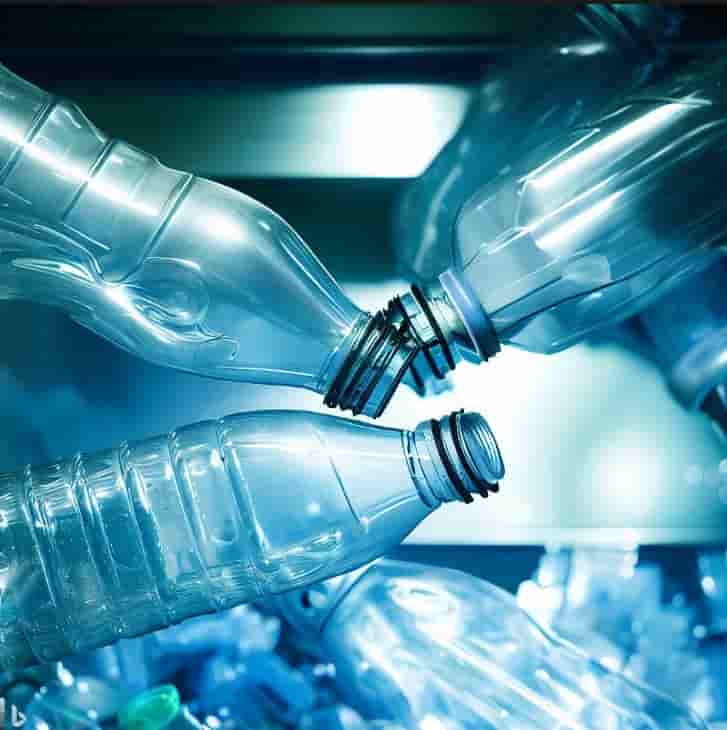
US Shale Firm CEO Projects Oil Prices Between $80-$100 a Barrel through 2024 Amidst Supply-Demand Dynamics
In the midst of an ever-changing global oil market, Scott Sheffield, the Chief Executive Officer of Pioneer Natural Resources, a leading US shale firm, has made a bold prediction regarding the price of oil for the next few years. Sheffield asserts that oil prices will likely range between $80 and $100 a barrel in 2023 and 2024 due to the continued demand growth outpacing the supply. However, this forecast is slightly more conservative than his earlier estimate of $90-$100 a barrel for the same period. Biochemicals Bio-Hybrid Engines
One significant factor contributing to this projection is the strategic output cuts implemented by Saudi Arabia, the world’s largest oil exporter, along with Russia. These cuts have been instrumental in bolstering oil prices, particularly in the wake of the COVID-19 pandemic that severely impacted global demand. Additionally, China’s commitment to boosting its economic growth has further contributed to the recent rally in oil prices.
Sheffield anticipates that the reduction in global oil inventories will persist throughout the remainder of the year, supporting the bullish outlook for oil prices. He also suggests that Saudi Arabia may extend its current 1 million barrels-per-day production cut, and a potentially smooth economic recovery in the United States could stimulate overall oil demand.
In recent months, the weak oil prices have taken a toll on drilling and completion activities for new oil wells as US shale producers have been compelled to restrain spending. The current global oil benchmark hovers around $83 a barrel, while US crude stands at approximately $79.36 per barrel, indicating an upward trend in prices.
As a result of the challenging market conditions, Pioneer Natural Resources has revised its projections and expects to maintain a flat average rig count by the end of the year, a notable departure from the initial forecast of adding 1-2 rigs annually. This move comes as the company aims to navigate the volatile market and respond prudently to the evolving dynamics. Biochemicals Bio-Hybrid Engines
Despite the hurdles, Pioneer Natural Resources continues to demonstrate resilience. Following a recent earnings report that surpassed expectations and a subsequent reduction in capital spending, the company’s shares experienced a 2.3% increase, reaching $229.74 on Wednesday afternoon.
Looking ahead, the global oil market remains subject to various uncertainties, including geopolitical tensions, production decisions by major oil-producing nations, and fluctuations in global demand. These factors will undoubtedly influence the trajectory of oil prices in the coming years, and Sheffield’s forecast is subject to change depending on how these dynamics unfold. Biochemicals Bio-Hybrid Engines
In conclusion, Scott Sheffield’s projection of oil prices between $80 and $100 a barrel through 2024 reflects a cautious optimism amid the complex supply-demand dynamics. While challenges persist in the industry, prudent actions by major oil-exporting countries and a positive economic outlook in the US may provide the necessary support for sustained oil price growth. As always, the oil market remains highly sensitive to unforeseen events, and industry players must remain vigilant in adapting to the ever-changing landscape.

Biochemicals Bio-Hybrid Engines

